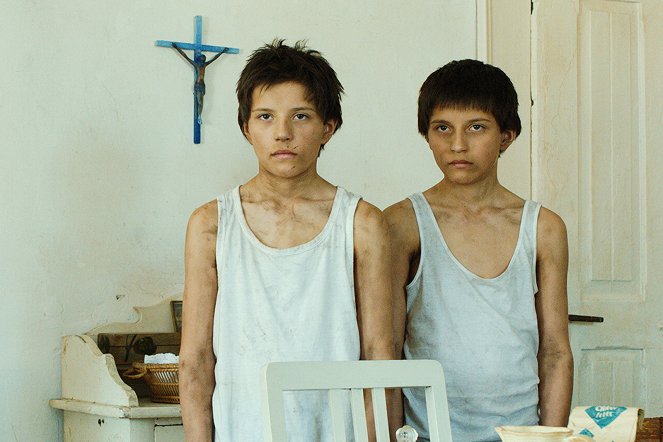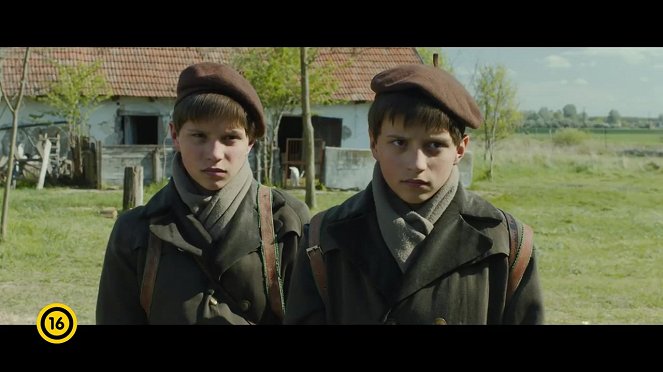Director:
János SzászCámara:
Christian BergerReparto:
András Gyémánt, László Gyémánt, Piroska Molnár, Ulrich Matthes, Ulrich Thomsen, Lajos Kovács, Orsolya Tóth, János Derzsi, Miklós Székely B., Péter Andorai (más)Streaming (1)
Sinopsis(1)
En el último año de la II Guerra Mundial, las grandes ciudades están a merced de constantes bombardeos y del hambre. Una madre desesperada lleva a sus hijos gemelos al campo, a casa de una abuela cruel y alcohólica de la que se rumorea que envenenó a su marido hace años. Los dos hermanos, que habían tenido una vida fácil, deben aprender a vivir solos en un entorno rural desconocido. Se dan cuenta de que solo sobrevivirán en el absurdo e inhumano mundo de los adultos si aprenden a no tener sentimientos. Solo si aprenden a liberarse del hambre y del dolor conseguirán enfrentarse a la dura vida que les espera. Fortalecen su espíritu leyendo la Biblia y aprendiendo idiomas. Cada día endurecen su cuerpo y su mente. Se insensibilizan ante los insultos y aprenden a ignorar las emociones y el amor. Los gemelos apuntan todo lo que ven durante la guerra en un cuaderno al que llaman "El gran cuaderno". Al escribir, siguen un código estricto: la prosa debe carecer de emoción, las anotaciones deben ser precisas y objetivas. Con el tiempo se inician en la corrupción y el horror de un mundo desgarrado por la guerra. Escuchan a un pastor lujurioso hablarles de la fe; ven a los soldados llevando a filas de personas a la muerte y son testigos de la crueldad de los vecinos del pueblo. La guerra termina y la ?liberación? trae algo aún peor: violaciones y saqueos. (Golem Distribución)
(más)Videos (2)
Reseñas (1)
Yes, Szász really did not live up to his reputation as an uncompromising and original filmmaker that he had in the 1990s. The Notebook looks more like an Eastern European HBO production - a relatively intimate expedition, repeating the same locations, and the fact that it is directed relatively sedentarily. If I deviate from these secondary categories, I also have complaints about the script, which is too dependent on the book by Ágota Kristóf. On the one hand, he draws harsh and raw monologues from it, on the other hand, he sometimes quite roughly motivates what seemed to look natural in the book. Nevertheless, Szász conquered me with these lessons in hardness, renunciation and suffering. The central duo of "wolves" is excellent, the grandmother is sweet and some of the supporting characters are irresistible. In particular, the middle of the film, in which the ruin of maternal love intertwines with the flow of swearing and drastic scenes, only captured artistically in a notebook, is amazing. War penetrates the boys' world as a reflection, and they fight their own war in order to defeat emotions and uproot all love. The stream of blows and deviant episodes, culminating in a drastic act, exudes a musty, unpleasant atmosphere that remotely resembles Haneke's The White Ribbon. It’s too bad about the unfinished stylization, but it’s still a significant experience.
()
Galería (28)
Foto © Pretty Pictures


